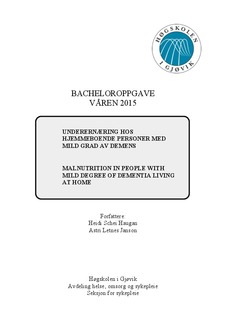| dc.contributor.author | Haugan, Heidi Schei | |
| dc.contributor.author | Janson, Astri Letnes | |
| dc.date.accessioned | 2015-07-21T09:52:34Z | |
| dc.date.available | 2015-07-21T09:52:34Z | |
| dc.date.issued | 2015 | |
| dc.identifier.uri | http://hdl.handle.net/11250/293427 | |
| dc.description.abstract | NORSK: Bakgrunn: Underernæring gir alvorlige konsekvenser for allmenntilstand og livskvalitet. Eldre hjemmeboende personer med demens er en særlig utsatt pasientgruppe. Norges politiske utvikling legger føringer for at flere eldre skal bo lenger hjemme. Dette krever tilrettelegging i hjemmet, blant annet i form av hjemmesykepleie. Hensikt: Hensikten med denne oppgaven er å undersøke hvordan hjemmesykepleieren kan bidra til å sikre ernæringsbehovet hos hjemmeboende personer med mild grad av demens. Metode: En litteraturstudie ble brukt som metode, med søk i Ovid Nursing Database, Cinahl Complete, AgeLine og PubMed. I søket brukte vi søkeord gruppert etter pasientgruppe, arena, problem og tiltak. I analysen er Aveyards tematiske analyse (“thematic analysis”) anvendt. Resultat: Seks forskningsartikler ble inkludert, og analyse av resultatene resulterte i en modell, resultatmodellen. Den presenterer fire aspekter som påvirker ernæringsstatusen: pasienten, demensdiagnosen, pårørende og sykepleieren. Konklusjon: Sykepleieren kan bidra til å sikre ernæringsstatusen gjennom kartlegging, samarbeid med og veiledning av pårørende. Demenssykdommen vil kunne endre pasientens kostholdspreferanser, noe sykepleieren må være bevisst. Begrensende faktorer er tidspress i hjemmesykepleien og manglende kunnskap, rutiner, interesse og oppmerksomhet på området. | nb_NO |
| dc.description.abstract | ENGLISH: Background: Malnutrition has severe consequences for a person's quality of life and general wellbeing. Elderly persons with dementia living at home are a particularly vulnerable group of patients. Political regulations in Norway dictate that the elderly are to live at home for a longer period of time. This requires adaptations at home, including in the form of home health care. Aim: The aim of this literature review is to examine how home health care can help to ensure the nutritional needs of people with mild degree of dementia living at home. Method: Literature study, with searches in Ovid Nursing Database, Cinahl Complete, Ageline and PubMed. We used keywords grouped according to patient, arena, problem and intervention. Aveyard’s thematic analysis is used in the analyze process. Results: Six articles were included. The analysis of these articles led to the result model. This model presents four aspects that affect the nutrition status: patient, the dementia diagnosis, next of kin and the nurse. Conclusion: To ensure that the nutritional needs are met, the nurse can map the patient, cooperate with and guide the next of kin. Dementia disease may change the patient’s diet, something the nurse has to be conscious of. Limitations in home health care are the lack of time and knowledge, routines, interest and attention for malnutrition. | nb_NO |
| dc.language.iso | nob | nb_NO |
| dc.subject | underernæring | nb_NO |
| dc.subject | eldre pasienter | nb_NO |
| dc.subject | hjemmesykepleie | nb_NO |
| dc.subject | demens | nb_NO |
| dc.title | Underernæring hos hjemmeboende personer med mild grad av demens | nb_NO |
| dc.title.alternative | Malnutrition in people with mild degree of dementia living at home | nb_NO |
| dc.type | Bachelor thesis | nb_NO |
| dc.subject.nsi | VDP::Medical disciplines: 700::Health sciences: 800::Nursing science: 808 | nb_NO |
| dc.source.pagenumber | 52 | nb_NO |
